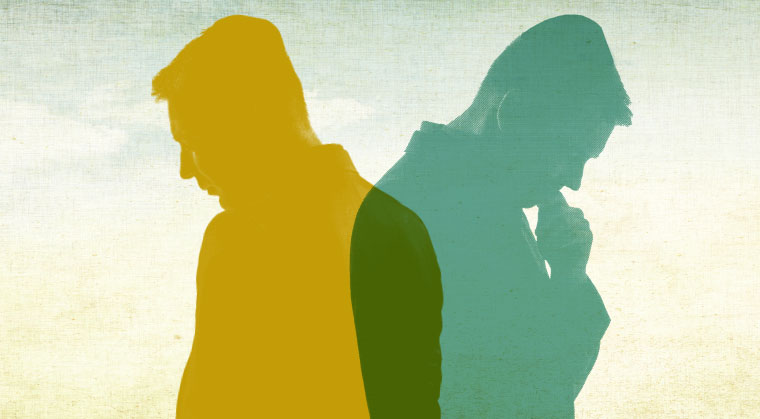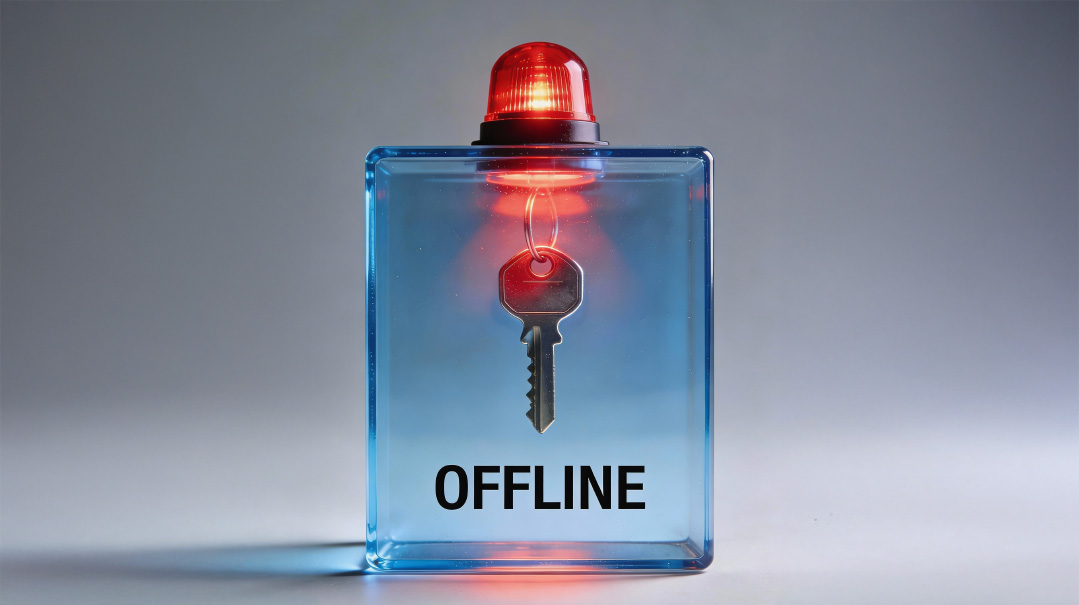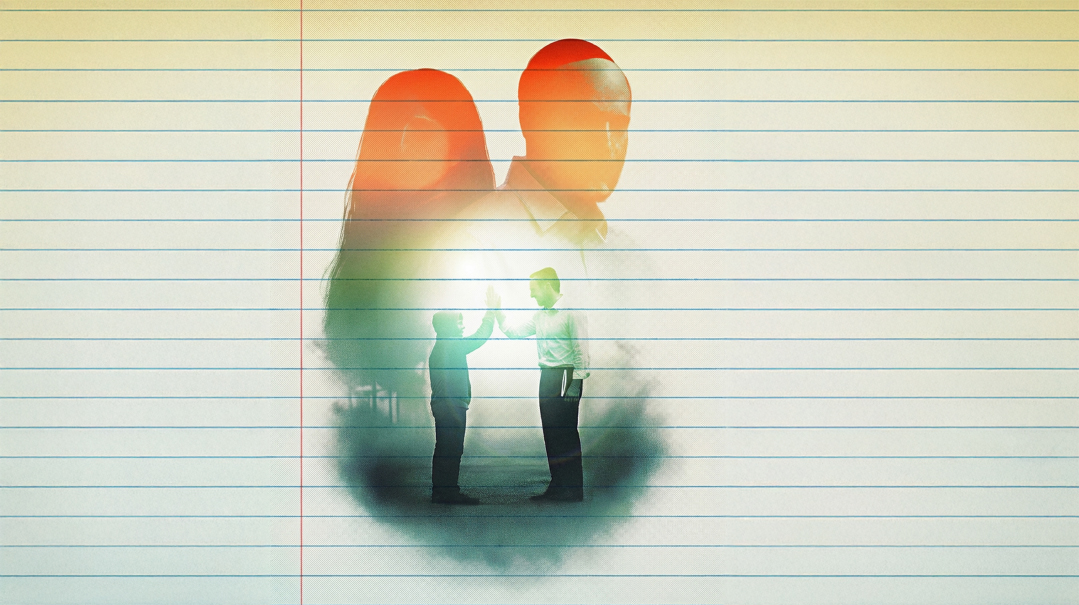Perfect Facade

Logically we knew it shouldn’t matter — even if Tziporah’s parents viewed us as failures, it wasn’t true. But emotionally it was too much to handle

"O
kay, everyone, time to get into the car!”
“Stop! Stop! Abba, she’s stepping on my gown!”
“Hey, Rina, take it easy. Let me…”
“Thanks, Pinny.” Tziporah sounded breathless. “Everyone, get into the car. Ari!” She looked around.
I put Rina down. “I’ll get him.”
He was facedown on his bed with his earbuds in his ears, no socks, but at least he was wearing his suit.
“Ari, time to go.”
He shot me a withering look. I was glad I hadn’t sent Tziporah to call him.
There are so many rules to parenting, and they all make sense: give the kid freedom to make choices and let them learn from mistakes, set boundaries and don’t make exceptions, be friendly, be authoritative, be firm, be flexible.
Which rule applied now?
Finally I said, “Are you coming to the wedding?”
He didn’t react. I felt the familiar, sinking feeling. Can you pray without moving your lips?
Then he got off the bed, put on his shoes, and got into the car.
We pulled up outside the wedding hall along with Tziporah’s sisters and their families. There was all the shrieking and kissing and exclaiming over how gorgeous everyone looked. I stopped unloading the car for a second and looked around.
Good.
We looked just like everyone else.
My wife Tziporah is the middle child of seven sisters. She didn’t have the confident trust a mother places in her oldest, and she didn’t get the indulgent love of the youngest. When she was born, the family was in financial crisis, and her mother never seemed to think she needed new clothes or school supplies or anything special of her own. She never seemed to think Tziporah herself was special, either. When Tziporah was in high school, her father’s business began to do very well, and their standard of living improved dramatically, but Tziporah always felt overlooked.
When I met Tziporah, I didn’t see any of that. I saw her brightness and creativity. I loved her laugh and I loved her dreams. I didn’t understand why she was so nervous when we were dating, but after we got engaged, she confided that she just couldn’t believe I would want her. I didn’t understand that either, until I got to know her family. There were already three brothers-in-law before me; they were happy to have me, but there wasn’t much fuss. I didn’t care; Tziporah and I built our own dream home, and I made sure she knew she was the most special person in it.
Don’t think the thing with Ari was all about image. We pulled out all the stops for him, pursued every lead, reached out to anyone who might be able to help. When he started to dress differently — even worse, talk differently, act differently — we didn’t avoid going places with him. Tziporah, who had felt so ignored as a child, made sure he knew we treasured him, accepted him, were proud to call him our son, no matter what.
The only sticking point was her family.
She had worked so hard to build herself up, to prove she was successful like her older sisters and special like the younger ones. She never brought the kids to her parents without making sure they looked perfect and were prepped to behave perfectly. I played my part, for her sake, the perfect son-in-law, a shtickel Torah at every meal.
Tziporah was a success. But the thing with Ari was threatening to kill that. Logically we knew it shouldn’t matter — even if Tziporah’s parents viewed us as failures, it wasn’t true. But emotionally it was too much to handle. That’s why we stopped going there for Shabbos. It was just so draining to be so “on” every minute, making sure that everything stayed perfect.
By the time Tziporah’s youngest sister Mimi got engaged, we were living from crisis to crisis. Ari was out of school and Tziporah had been forced to stop working. We were desperate to find help but we had no money to pay for it, we had no money to pay for anything. Ari was suffering, Tziporah was suffering, our other kids were suffering. Tziporah was living and breathing the whole Ari thing every moment of her life without a break — that pit in your stomach when you know that if you dropped your guard, something terrible would happen. Tziporah was dreading the wedding, but how can you skip your own sister’s wedding?
I held my breath through the shmorg and the chuppah. Ari was okay, but it was a matter of time, and sure enough, when I went to call him for the family picture, he gave me a stony no and disappeared outside.
I wished I hadn’t asked him. Maybe if I’d left him alone, he’d at least have stayed in the building. Maybe he would have relaxed a little, enjoyed some time with his cousins, or at least had fun watching the band. Why did I have to ask him? Now he was outside somewhere — doing what? Would he come back in? What was I going to tell Tziporah?
Which turned out to be the least of my problems. Because what was I going to tell my mother-in-law?
“Pinny, Tziporah, where are your kids?”
I tried my best. “We’re here, Ma.” The photographer was shouting and the lights were too bright.
“I don’t see Ari, please get him, everyone else is here already!”
“I think we should just start without him,” Tziporah said. Her voice shook.
My mother-in-law lost it. “Are you crazy? This is the family picture. Do you know how hard I worked to get everyone here together? If we wait one more minute people are going to start to leave, look, Chaya’s kids keep wandering away. Do you think we can wait forever? Just get him in here! Everyone else is here!”
I swallowed. “I know, Ma, I’m sorry. Look, I don’t think it’s worth it for me to go trying to find him, it will take too much time and like you said everyone is waiting—”
“Hey, Mom! Mother of the bride. Can I get you over on the right? Come on, let’s get this, we’re almost done, come on everyone!”
My mother-in-law looked over at the photographer, “Just one minute, I’m so sorry, my grandson is coming—”
“He’s not coming Ma, I really think we should just—”
“You really think? You really think? You know what I think? Look at everyone here.” She waved an arm wildly in the direction of the entire extended family, who were standing in a slowly disintegrating pose, watching open-mouthed at the drama playing out in front of them. “Every single person here has kids! Most of them have more kids than you! Most of them are younger than Ari! Rochie has newborn twins! Every single person here managed to get themselves and all their kids here together for one dumb picture, but no, Ari has to do his own thing, and you enable him!”
She turned away from us, breathing heavily, and took her place beside the kallah.
The photographer’s voice was loud in the silence. “Okay, ladies and gents, let’s get this one last shot wrapped up real fast…”
Neither Tziporah or I are smiling in that picture.
That simchah was our lowest moment. Not that Ari did anything worse than usual. But because we lost face in front of my in-laws.
That’s how I came to tell Yehuda. I was sitting in my car that Sunday night, looking at my house, feeling awful because I knew Tziporah needed me in there, but I just couldn’t bring myself to go in.
I even told Yehuda that. I told him everything.
But it was Yehuda; he was also a Cohen son-in-law. He had teenagers way older than Ari, he was sharp, he got the whole dynamic with my in-laws. We were very close. I knew I could trust him.
Except that I couldn’t.
I didn’t realize this until months later that it must have been the very next day that Yehuda turned around and told my in-laws everything. The things Ari was doing, the things Tziporah was saying, the bills and the threats and the other kids and the things I’d hesitated to say because they were so painful I didn’t even want to say them out loud — but I’d told Yehuda because I trusted him completely. I know why he did it: so they would help us — big tzaddik.
Tziporah was totally humiliated. We were suffering before, but Yehuda destroyed whatever we still had left. I can still feel the incredulity of that moment. With everything that happened, it is that betrayal that hurts the most.
That was almost a year ago. Things are better now, thank G-d. Ari’s in a better place, we’re all in a better place. The bitterness of the worst pain is soothed when I see the returning sparkle in Ari’s eyes reflected in Tziporah’s. One day we will heal, one day we will be better people, one day we will understand more.
But I will never understand Yehuda.
I don’t want to talk to Yehuda. But if I did, there is one thing I would say to him: You knew how things were. How could you betray me like that?
Yehuda
Pinny and I are the best kind of brothers-in-law — we married sisters. A brother-in-law sees things, but not too much; there’s enough distance that the closeness doesn’t get uncomfortable. Pinny was showing up at my in-laws for Shabbos less and less frequently, but I’d seen enough of Ari to know things were complicated.
It was excruciating to watch that showdown at the wedding. Tziporah looked like she was at a funeral; my mother-in-law was white with anger, and this was happening in front of the photographer and every single family member who was supposed to be in the extended-family picture.
Pinny and Tziporah did not come to Shabbos sheva brachos.
I wasn’t sure what to do, figured I’d call Pinny to check in, and if he wanted to talk, he would.
He did. He talked and talked. It was much worse than I’d imagined.
He talked about the impossibility of getting Ari to do anything he didn’t want to do.
He talked about the things an eleven-year-old yeshivah kid could access if he wanted to.
He talked about the yeshivah wanting to kick him out, and how he couldn’t blame them, and how he couldn’t get Ari to go to school most days anyway. How Tziporah had basically been forced to quit her job to be on call or at home with Ari, and now they were over their heads in debt without her income. How they were desperately trying every possible therapy and intervention, but they had no money to pay the professionals, and how their entire family was living in fear, tiptoeing around Ari, afraid to make things worse but watching helplessly as it happened anyway. And how the psychologist was refusing to continue working with them if they didn’t pay their balance, and how they had so much hope for the “big brother” they had hired, but he needed to be paid too. There was a program they desperately wanted Ari to attend, but it was tens of thousands of dollars, and there were also groceries, mortgage, utilities. And how there had been another blowup after the wedding — he choked on the details, something about Ari refusing to attend Shabbos sheva brachos and their fear of what he would do if they tried to force him. Tziporah had cried hysterically that she couldn’t even attend her own sister’s Shabbos sheva brachos but she didn’t even care because they didn’t even have enough money for her to get her sheitel reset. And that he was sitting outside in his car right now, talking to me, because he was crying too hard to go inside.
Who can absorb such pain?
I couldn’t fix Ari. I had no advice for Pinny. But what killed me was the money. On top of everything else, do they also have to go without groceries? If there was a psychologist or program that could help Ari, it was inconceivable that money would be a barrier!
I didn’t have any money.
But my father-in-law did.
I went to see my father-in-law at his office. I knew better than to have this conversation with my mother-in-law around.
When he greeted me, “Hello, Yehuda, sit down,” there was an inflection. I wonder if he intuited why I’d come.
I tried to ease into it. “How are you, Abba? Recovered from the wedding?”
“A wedding is not an illness. I don’t need to recover.” He lifted his eyes. “The weddings are what we hoped for all the years. It’s the nachas.”
“Im yirtzeh Hashem you’ll have only nachas always from all your children and grandchildren.”
He nodded. “Amen.”
I wasn’t sure how to start. My father-in-law is a businessman. I tried to be businesslike.
“I had a conversation with Pinny recently…”
His face hardened.
“You know they’re not having such an easy time with Ari.” Of course he knew. You couldn’t miss it. And even if it hadn’t registered until now, he’d seen what happened at the wedding. Everyone had seen what happened at the wedding.
My father-in-law folded his arms. “Tell me, what kind of daughter doesn’t join her family for her youngest sister’s Shabbos sheva brachos?”
I tried to choose my words carefully, to say as little as possible, but if I was too gentle he’d miss the point. And this had to be done. There was no other way.
I saw his face crumple as I talked. He passed a hand over his eyes.
“Abba?” I said tentatively.
With his eyes still closed, he waved me away, as if to say leave me alone a minute. But when he opened his eyes again his gaze was firm.
“How much do they need?”
We made a cheshbon together — the therapy, the big brother, Tziporah’s salary. He threw in an extra five thousand to cover accumulated debt and we arranged that I’d come by for the money every first of the month.
He walked me to the door. “The Eibeshter,” he said carefully, “has nachas when Yidden take care of each other, just like a parent has nachas when his children take care of each other.”
I wished I could repeat that comment to Pinny.
The check was cashed by Pinny’s rav and transferred to him anonymously. I think he told him something about a shul fund; Pinny was in no position to refuse.
I saw Pinny next a few weeks later, still troubled, but no longer out of control. Eight months after the wedding fiasco, we made a bar mitzvah, which Pinny and Tziporah attended with all their children, including Ari. When Succos rolled around a few months later, I was happy to hear that Pinny and Tziporah would be at my in-laws for first days along with us.
When we walked into the kitchen on Erev Succos, Pinny was there already. He turned around and made eye contact, and immediately, I saw that he knew.
He knew I had told our father-in-law.
We were there together for a three-day Yom Tov, and we didn’t exchange a single word.
I know he feels like I betrayed him. Maybe I did. I don’t know. Pinny needed help. I helped him. Pinny is okay. Tziporah is okay. Ari is okay. Their family is okay. Their family was saved.
Pinny doesn’t want to hear from me. But if I could tell him one thing, it would be: I did it because I love you. And even knowing how things turned out, I would do it all over again.
(Originally featured in Mishpacha, Issue 698)
Oops! We could not locate your form.






